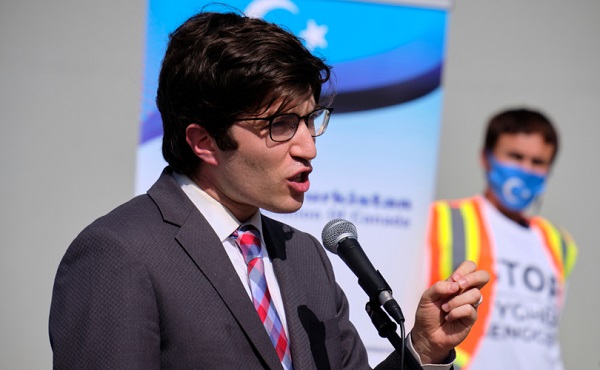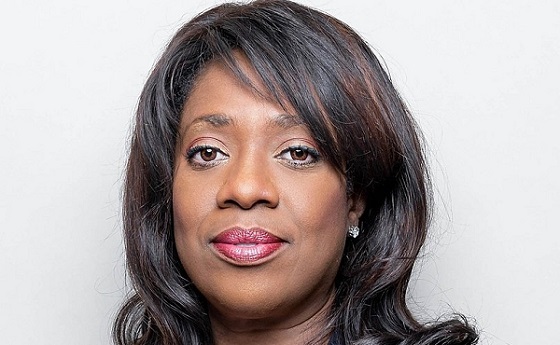International
Why Biden’s Gaza refugee plan is a hard hell no

From Todd Bensman
As published May 7, 2024 by The New York Daily News
Just about all of the Gaza Strip’s two million inhabitants have gone through decades of institutionalized cradle-to-grave indoctrination into the ruling Hamas’ upside down 7th century Islamist value system, which features at its core and extremely violent religious ideology.
As President Biden considers bringing Gaza war refugees into the United States, he would do well to recall what happened when other good-hearted people took a similar chance – and paid with their blood.
Before the October 7 Hamas attack, Israeli citizens sponsored work permits for thousands of security-vetted Palestinians to earn money working on some of their farms in towns not far from the Gaza Strip.
Some of those Gazan day laborers are believed to have used their access to provide tactical information that helped Hamas terrorists kill hundreds of Israelis on October 7.
The bad apples lesson of that still developing story – and another where security-vetted Palestinian UN workers directly assisted the October 7 attackers – is central to the problem with an American plan to import Gazan war refugees. It’s an unacceptable national security risk.
That’s because just about all of the Gaza Strip’s two million inhabitants have gone through decades of institutionalized cradle-to-grave indoctrination into the ruling Hamas’ upside down 7th century Islamist value system, which features at its core and extremely violent religious ideology.
Hamas relentlessly preaches that humanity’s highest virtues are suicide bombing, armed combat, genocide, intolerance of difference, and a dehumanizing hatred of Jews and Americans.
Yes, there will be exceptions among Gazans who are independent-minded enough to rebel. But if Israel can’t readily suss out the tolerant, then certainly America’s refugee bureaucrats will have far less luck.
A large number of respectable academic and think tank studies have shown how Hamas indoctrinates the people of the Gaza Strip.
Recall the recent reports of jubilant children, women and men cheering, spitting at, and even beating both alive and dead Israeli hostages paraded through Gaza after the October 7 attack.
“These are the people you might be bringing here,” said Nayla Rush, a refugee policy expert for the Washington, D.C.-based Center for Immigration Studies, who recently penned a column titled “Resettled Refugees Do Not Necessarily Leave Their Beliefs and Biases Behind.” “How are you going to vet them? What do you do, go to the Hamas authorities and ask? That’s a huge breach of any vetting. It’s impossible.”
|
|
Hamas starts things up in kindergarten and ramps up the ideological training all the way through the Islamic University of Gaza, a redoubt of hatred established by Hamas’ founding father in 1978 and which offers law degrees from a “Sharia Law Department” and whose engineering department is there to churn out combat engineers for Hamas tunnels.
As a 2013 New York Times report put it, the required school textbooks and curriculum “infuse the next generation with its militant ideology” as part of a required national education course of study in government schools.
SEE ALSO: Debunking The Argument For Columbia Journalism School’s Terrorist Propagandist Memorial
The children are taught never to recognize modern Israel as anything more than a target of genocidal violence, Gaza school curricula is replete with thousands of examples of violent incitement against the Jewish state and Jewish people.
Tens of thousands have attended Hamas summer camps, where its armed terrorist operatives serve as camp counselors dishing out violent Islamist ideology and military training to prep them for conscription into Hamas’ armed forces.
Teachers and authority figures of every stripe teach the children that waging jihad that kills Jews is a solemn religious duty where martyrdom earns the believer paradise in heaven, a November 2023 analysis of collected Arabic television news segments shows.
“The next generation of Palestinians is being relentlessly fed a rhetorical diet that includes the idolization of terrorists, the demonization of Jews and the conviction that sooner or later Israel should cease to exist,” Yuval Steinitz, Israel’s minister of intelligence and international affairs, wrote in a 2013 New York Times opinion column.
|
|
He noted that, for instance, some Facebook pages of government-supported Palestinian schools glorified Adolph Hitler’s genocide against European Jewry and that “Jews and Zionists are horrible creatures that corrupt those in their vicinity.”
A 2021 European Union analysis of 156 Palestinian school textbooks found that many glorified suicide terrorists as role models and demonize Jews as dangerous and deceptive so as to generate feelings of hatred.
Hamas’ popular Al Aqsa TV gained international notoriety when its children’s show star, the Mickey Mouse-like character, Farfour, was outed for promoting radical Islam, hatred of Jews, and for urging children to take up AK-47 assault rifles.
The station’s response to international outrage was to depict an “Israeli” bureaucrat unjustly beating Farfour to death, then replaced the character with a bee named Nahool who continued to preach violence.
And so much for tolerance. Any Gazan at any age who might be brought to the United States can be expected to regard non-Muslims as sub-human after years of indoctrination backed by extreme violence against Christians in Gaza.
Islamist proselytizers have kidnapped thousands of Christians and forced them to convert to Islam and burned churches to the ground.
The tiny population of Christians that have not fled Hamas persecution remain subject to targeting “in ways even more acute and systemic than Christians in the West Bank and Israel,” a 2022 University of Notre Dame analysis concluded.
Christians feel coercion to covert to Islam, while Christian women are harassed and pressured to cover their hair and adopt Islamic forms of clothing.
Polling of Gazans consistently show majority support for the October 7 attack and for Hamas, whose backing has risen since the attack.
And large majorities have long viewed the United States as an enemy of Palestinian Arabs, one Pew poll showing that number at 76% a decade ago and soaring, if that is even possible, since the new war began
“The level of anti-Americanism and anti-Westernism is huge among Palestinians because of the positions they have taken regarding international humanitarian law and what is happening in Gaza,” pollster Khalil Shikaki told the Associated Press in December.
Absent even a national security risk in importing men, women and children deeply schooled in blood lust, why would the Biden administration think it wise to import such America-haters into the country?
But in the end, Gazans must be regarded as too great a national security threat for a US humanitarian gambit.
By all means, do facilitate their exits to friendlier and safer neighborhoods in the region. Provide humanitarian aid. Arrange for medical treatment elsewhere. Send doctors on the UN Navy’s Mercy hospital ship.
But importing them into the United States as refugees? These are not the people, and this is definitely not the time.
Todd Bensman is a senior national security fellow at the Center for Immigration Studies.
Business
I Was Hired To Root Out Bias At NIH. The Nation’s Health Research Agency Is Still Sick


From the Daily Caller News Foundation
By Joe Duarte
Federal agencies like the National Institutes of Health (NIH) continue to fund invalid, ideologically driven “scientific” research that subsidizes leftist activists and harms conservatives and the American people at large. There’s currently no plan to stop.
Conversely, NIH does not fund obvious research topics that would help the American people, because of institutional leftist bias.
While serving as a senior advisor at NIH, I discovered many active grants like these:
“Examining Anti-Racist Healing in Nature to Protect Telomeres of Transitional Age BIPOC for Health Equity” — Take minority teens to parks in a bid to reduce telomere erosion (the shortening of repetitive DNA sequences as we age). $3.8 million in five years and no results published – not surprising, given their absurd premise.
“Ecological Momentary Assessment of Racial/Ethnic Microaggressions and Cannabis Use among Black Adults” – This rests on an invalid leftist ideological concept – “microaggressions.” An example of a “microaggression” is a white person denying he’s racist. They can’t be validly measured since they’re simply defined into existence by Orwellian leftist ideology, with no attempt to discover the alleged aggressor’s motives.
“Influence of Social Media, Social Networks, and Misinformation on Vaccine Acceptance Among Black and Latinx Individuals” — from an activist who said the phrase “The coronavirus is genetically engineered” was “misinformation” and also conducted a bizarre, partisan study based entirely on a Trump tweet about recovering from COVID.
I will be leaving the great Walter Reed Medical Center today at 6:30 P.M. Feeling really good! Don’t be afraid of Covid. Don’t let it dominate your life. We have developed, under the Trump Administration, some really great drugs & knowledge. I feel better than I did 20 years ago!
— Donald J. Trump (@realDonaldTrump) October 5, 2020
The study claimed that people saw COVID as less “serious” after the tweet. I apologize for the flashback to when Democrats demanded everyone feel the exact level of COVID panic and anti-optimism they felt (and share their false beliefs on the efficacy of school closures, masks, and vaccines ). NIH funded this study and gave him another $651,586 in July for his new “misinformation” study, including $200,000 from the Office of the Director.
I’m a social psychologist who has focused on the harms of ideological bias in academic research. Our sensemaking institutions have been gashed by a cult political ideology that treats its conjectures and abstractions as descriptively true, without argument or even explanation, and enforces conformity with inhumane psychologizing and ostracism. This ideology – which dominates academia and NIH – poses an unprecedented threat to our connection to reality, and thus to science, by vaporizing the distinction between descriptive reality and ideological tenets.
In March, I emailed Jay Bhattacharya, Director of NIH, and pitched him on how I could build an objective framework to eliminate ideological bias in NIH-funded research.
Jay seemed to agree with my analysis. We spoke on the phone, and I started in May as a senior advisor to Jay in the Office of the Director (NIH-OD).
I never heard from Jay again beyond a couple of cursory replies.
For four months, I read tons of grants, passed a lengthy federal background check, started to build the pieces, and contacted Jay about once a week with questions, follow-up, and example grants. Dead air – he was ghosting me.
Jay also bizarrely deleted the last two months’ worth of my messages to him but kept the older ones. I’d sent him a two-page framework summary, asked if I should keep working on it, and also asked if I’d done something wrong, given his persistent lack of response. No response.
In September, the contractors working at NIH-OD, me included, were laid off. No explanation was given.
I have no idea what happened here. It’s been the strangest and most unprofessional experience of my career.
The result is that NIH is still funding ideological, scientifically invalid research and will continue to ignore major topics because of leftist bias. We have a precious opportunity for lasting reform, and that opportunity will be lost without a systematic approach to eliminating ideology in science.
What’s happened so far is that DOGE cut some grants earlier this year, after a search for DEI terms. It was a good first step but caught some false positives and missed most of the ideological research, including many grants premised on “microaggressions,” “systemic racism,” “intersectionality,” and other proprietary, question-begging leftist terms. Leftist academics are already adapting by changing their terminology – this meme is popular on Bluesky:
DOGE didn’t have the right search terms, and a systematic, objective anti-bias framework is necessary to do the job. It’s also more legally resilient and persuasive to reachable insiders — there’s no way to reform a huge bureaucracy without getting buy-in from some insiders (yes, you also have to fire some people). This mission requires empowered people at every funding agency who are thoroughly familiar with leftist ideology, can cleanly define “ideology,” and build robust frameworks to remove it from scientific research.
My framework identifies four areas of bias so far:
- Ideological research
- Rigged research
- Ideological denial of science / suppression of data
- Missing research – research that would happen if not for leftist bias
The missing research at NIH likely hurts the most — e.g. American men commit suicide at unusually high rates, especially white and American Indian men, yet NIH funds no research on this. But they do fund “Hypertension Self-management in Refugees Living in San Diego.”
Similarly, NIH is AWOL on the health benefits of religious observance and prayer, a promising area of research that Muslim countries are taking the lead on. These two gaping holes suggest that NIH is indifferent to the American people and even culturally and ideologically hostile them.
Joe Duarte grew up in small copper-mining towns in Southern Arizona, earned his PhD in social psychology, and focuses on political bias in media and academic research. You can find his work here, find him on X here, and contact him at gravity at protonmail.com.
Daily Caller
Trump Gives Zelenskyy Until Thanksgiving To Agree On Peace Deal, With U.S. Weapons And Intel On The Line


From the Daily Caller News Foundation
President Donald Trump is turning up the heat on Ukrainian President Volodymyr Zelenskyy to accept a peace deal to end his war with Russia, and has set a deadline with potential consequences.
The U.S. is warning that certain weapons shipments and intelligence sharing could be at risk if Zelenskyy does not play ball with Trump’s peace proposal, Reuters reported on Friday. The president set a Thanksgiving deadline for Zelenskyy to sign off on the details. Speaking with Brian Kilmeade on Fox News Radio, Trump confirmed that date, saying that while deadlines can be extended, “Thursday is it.”
Speaking with Brian Kilmeade on Fox News Radio, Trump confirmed that, though deadlines can be extended, “Thursday is it.”
Zelenskyy signaled his willingness to discuss concessions outlined in the proposed peace deal despite objections from other European leaders over the terms, and said in a post on X that his whole government is at work on the individual points. However, the Ukrainian leader also said in a Friday video statement that the U.S. has put Ukraine in a position of “either losing its dignity or the risk of losing a key partner.”
Russian President Vladimir Putin, on the other hand, said Friday Trump’s plan could “form the basis” for a final peace agreement.
A U.S. official told the Daily Caller News Foundation they “will not comment on sensitive peace discussions that may or may not have happened.”
“President Trump is working with both sides to end the war as quickly as possible, which has gone on for far too long, with too many senseless deaths,” the official said. “This would have never happened if he was President.”
Zelenskyy most recently has been embroiled in a corruption scandal, as the National Anti-Corruption Bureau of Ukraine launched a probe into Zelenskyy’s business partner, who allegedly laundered $100 million from Ukraine’s nuclear energy company.
“It was strongly implied to the Ukrainians that the United States expects them to agree to a peace deal,” another U.S. official told the DCNF. “Any changes will be decided upon by the President himself.”
The Ukrainian leader has been working to shore up support in Europe as well, most recently signing a deal with France to obtain 100 Rafale jets for its air force. The deal also included anti-air equipment, drones and other munitions.
The Trump administration has worked to offload direct military support for Ukraine to partners in Europe, with NATO agreeing to purchase U.S. weapons to then ship to Ukraine, instead of the American government delivering directly.
-

 COVID-1911 hours ago
COVID-1911 hours agoNew report warns Ottawa’s ‘nudge’ unit erodes democracy and public trust
-

 Great Reset2 days ago
Great Reset2 days agoEXCLUSIVE: A Provincial RCMP Veterans’ Association IS TARGETING VETERANS with Euthanasia
-

 Health2 days ago
Health2 days agoDisabled Canadians petition Parliament to reverse MAiD for non-terminal conditions
-

 Daily Caller2 days ago
Daily Caller2 days agoSpreading Sedition? Media Defends Democrats Calling On Soldiers And Officers To Defy Chain Of Command
-

 Crime1 day ago
Crime1 day agoHow Global Organized Crime Took Root In Canada
-

 Digital ID2 days ago
Digital ID2 days agoLeslyn Lewis urges fellow MPs to oppose Liberal push for mandatory digital IDs
-

 Business2 days ago
Business2 days agoThe Payout Path For Indigenous Claims Is Now National Policy
-

 Energy1 day ago
Energy1 day agoExpanding Canadian energy production could help lower global emissions






